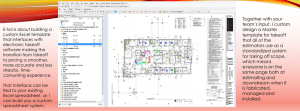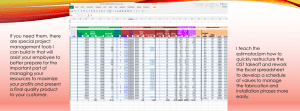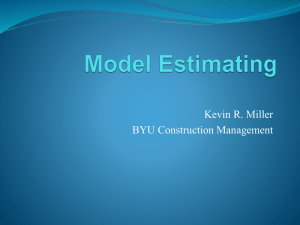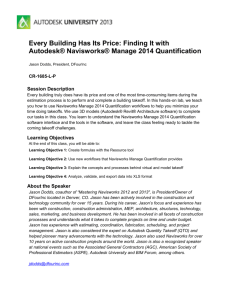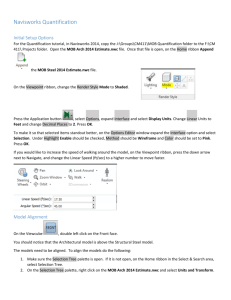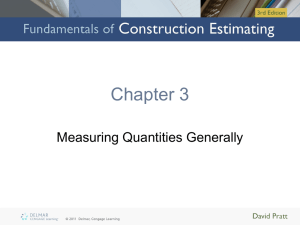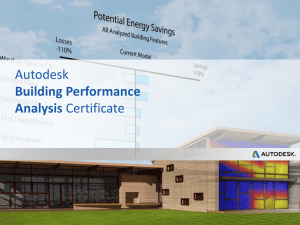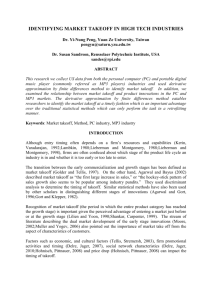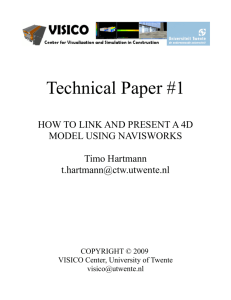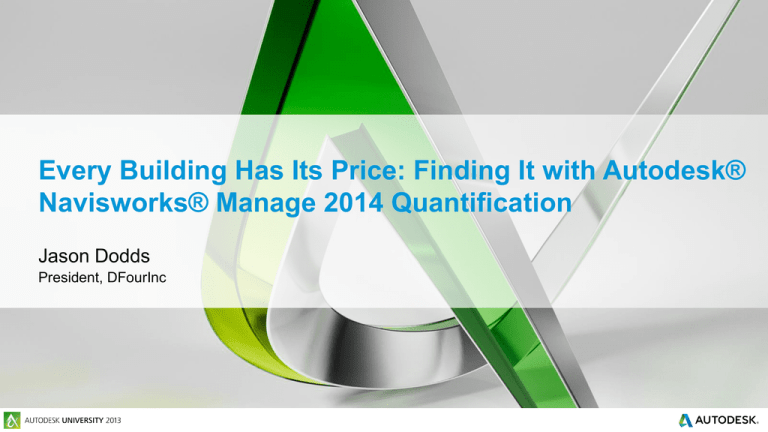
Every Building Has Its Price: Finding It with Autodesk®
Navisworks® Manage 2014 Quantification
Jason Dodds
President, DFourInc
Class summary
Every building truly does have its price and one of the most timeconsuming items during the estimation process is to perform and
complete a building takeoff. In this lecture, we teach you how to use
Navisworks Manage 2014 Quantification workflows to help you
minimize your time doing takeoffs. We use 3D models (Autodesk®
Revit® Architecture software) to complete our tasks in this class. You
learn to understand the Navisworks Manage 2014 Quantification
software interface and the tools in the software, and leave the class
feeling ready to tackle the coming takeoff challenges.
Key learning objectives
At the end of this class, you will be able to:
Learning Objective 1: Create formulas with the Resource tool
Learning Objective 2: Use new workflows that Navisworks
Manage Quantification provides
Learning Objective 3: Explain the concepts and processes behind
virtual and model takeoff
Learning Objective 4: Analyze, validate, and export data into XLS
format
Getting Started – Quantification Tools
Before we get into the hands on, lets explore some of the interface,
terminology and tools we will be using today
Quantification Process Overview
Managing Design
Information
Autodesk Revit
Item & Resource
Management
Autodesk Navisworks
Model Based
Quantification
Change Analysis &
Reporting
Autodesk Navisworks
Autodesk Navisworks/
3rd Parties
Quantification Workbook
The Quantification Workbook is the key to Navisworks Quantification
and where you will perform the majority of your takeoff efforts.
Item Catalog
The Item Catalog is the
organizational database for your
takeoff. The Item Catalog and
Resource Catalog share the same
structure, a selection tree, variables
pane, and general information.
Items in the Item Catalog can be
directly associated with a model
object, such as a wall or window.
Items can exist alone or can contain
resources.
Resource Catalog
The Resource catalog is a
database of your resources for a
project. Resources could be
related by function and type such
as materials, equipment or tools,
and may include wallboard,
coverings or structural
components. Resources are
attached to Items.
Model Takeoff
Model Takeoff allows you to quantify your models form properties or selections
directly in the model or Navisworks Canvas.
To carry out model takeoff, objects must be either a group, layer or model. If you try
to takeoff a model object that is an instance, or if the object does not contain a
GUID or properties, an error message is displayed. Ensure your workbook is in Item
view before performing takeoff.
Virtual Takeoff
Virtual takeoff can be carried out when you want to add takeoff objects
that are not linked to a model object or item, for example:
Where an object has geometry, but has no properties
Where an object does not have geometry, and has no properties
This could be the case if you did not save the properties from the
original design application with your file, or that the object you want to
takeoff does not exist in the model. In both cases, you can associate a
viewpoint with the virtual takeoff object so you can navigate your way
back to it during the takeoff process.
Change Analysis
Change Analysis enables you to compare changes to properties
between model versions. You can then review the changes to decide
whether to give approval. If you make changes to your takeoff data in a
project, you receive status notifications in Quantification that highlight
what has been changed and what type of change has been made.
Change Analysis – Status Notifications
When an item or group is
changed, a warning flag appears
in the Navigation pane and a
green or blue triangle appears in
the cell. The overridden formula
also appears in bold in the Item
Catalog. Once Change Analysis
is carried out, the following
notifications appear in the Status
column of the Quantification
workbook.
Quantification Appearances and Selection
Select
Select Model items that correspond to
takeoff items
Hide Takeoff
Hides all items that have been takeoff
Show Takeoff
Hides all model items that have not
been takeoff and shows taken off items
Quantification Appearance
Controls the appearance of the model
Importing and Exporting
Use this drop down to import
and export catalogs and
quantities
Catalogs can be exported to
XML and opened in Excel for
editing
Let’ Get into Hands on Time
Open Navisworks!
Resource Formulas
Concrete 3000 PSI
Length Formula "=ModelLength" Units " Unspecified ”
Width Formula "=ModelWidth" Units " Unspecified ”
Thickness Formula "=ModelThickness" Units " Unspecified ”
Height Formula " Unspecified " Units "Unspecified”
Perimeter Formula " Unspecified" Units "Unspecified”
Area Formula "=Length*Width" Units "SquareFeet”
Volume Formula "=(Length*Width*Thickness)*0.03704" Units "CubicYard”
Weight Formula="=Volume*4050" Units "Pound”
Count Formula "=1" Units "Each”
Formwork
Length Formula "=ModelLength" Units "Feet"
Width Formula "=ModelWidth" Units "Feet"
Thickness Formula "=ModelThickness" Units "Feet"
Height Formula " Unspecified " Units "Unspecified"
Perimeter Formula " Unspecified " Units "Unspecified"
Area Formula "=((ModelWidth+ModelLength)*2)*ModelThickness Units "Square Feet"
Volume Formula "=Area*0.333" Units "Cubic Feet"
Weight Formula="=Area*9" Units "Pound"
Count Formula "=1" Units "Each"
Resource Formulas
Autodesk is a registered trademark of Autodesk, Inc., and/or its subsidiaries and/or affiliates in the USA and/or other countries. All other brand names, product names, or trademarks belong to their respective holders. Autodesk reserves the right to alter product and services offerings, and specifications and pricing at any time without notice, and is not responsible for typographical or graphical errors that may appear
in this document. © 2013 Autodesk, Inc. All rights reserved.

